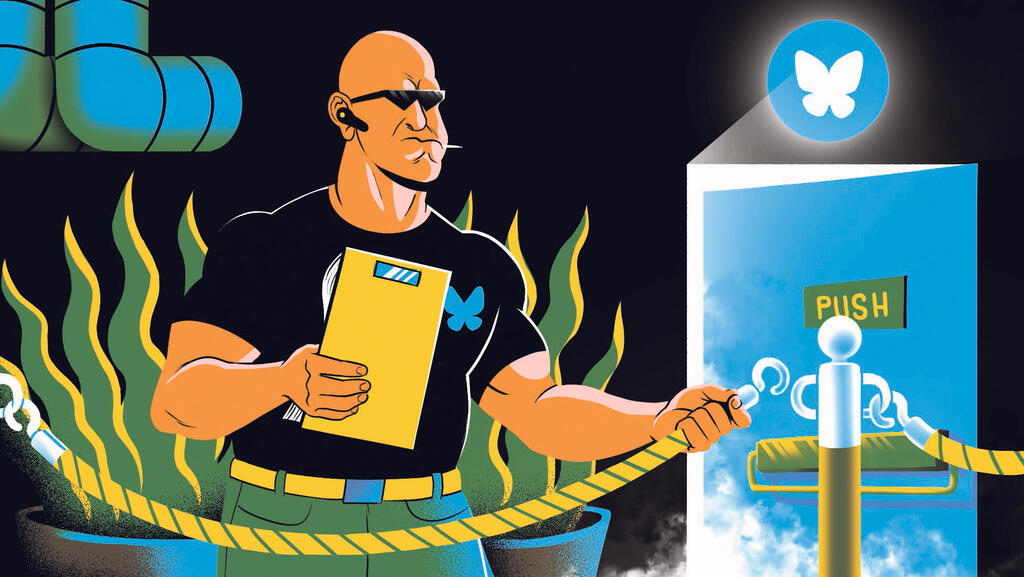
Nice try, Bluesky: New social network opens doors to all, but public interest dwindles
The buzz around the Bluesky social network was generated thanks to its limited and privileged user group in the experimental phase. But when the doors of the club were opened to everyone, there was little interest in it
The Bluesky social network opened to the general public last week. A year ago it made a splash when it launched in its experimental, limited beta version, but when it finally hit the the real world last week, few were there to notice. What does this lack of interest indicate if not the short-lived nature of the technology sector. This is another moral about the fragility of hype.
When Elon Musk completed the acquisition of Twitter (now renamed X) many were looking for an alternative, anything but not giving the capricious billionaire control over their daily chat. Groups of journalists, researchers and plain liberals pushed for mass immigration away from X. Two targets were chosen: Bluesky and Mastodon, both of which were based on the idea of an open protocol, which apparently answered the fear of one person or a group of tyrants controlling the discourse. Bluesky was considered more similar in its functionality and easier to use, and was called a "Twitter clone".
Bluesky was conceived in 2019 by, among others, Twitter co-founder Jack Dorsey, and the company launched its beta version in February 2023. The timing of the launch was perfect, coming just as Musk was sowing anarchy and panic on Twitter. He fired most of the employees, disrupted the network's safety mechanisms, limited the amount of posts (then they were still called tweets) that a user could see, highlighted his personal user and pushed any unverified user into the abyss of irrelevance. It is against this background that Bluesky's proposal seemed especially intriguing: a social network as a non-profit organization, backed by well-known figures from the industry, and where apparently no person can arbitrarily set the rules.
The amount of media attention Bluesky got was something few young social networks received, and all this without much innovation or originality. Bluesky enjoyed global coverage in all the major newspapers and leveraged it well: for a whole year the network maintained itself in the beta phase, opening its doors to a total of 2 million users. It's not much, but enough to produce a social network that can sustain itself. These users were entitled to get early access to the product only if they managed to get their hands on an invitation and code.
1. No club membership
A "beta experiment" is a fairly common mechanism that startups operate in relation to technological products, applications or other developments. At that stage the beta is limited, the companies issue some invitations to members, then each invitee can pass on some more invitations to others. The privacy and selectivity are done for a specific reason, usually because the startup does not yet have enough capabilities to support mass use of the product or because the code is unstable. This stage is designed to allow the system to operate with real "customers" on a small scale, and to allow developers time to fix unexpected faults during the trial period - what is known as "running". The phenomenon has long since become an event that symbolizes status, a party to which only the beautiful few are invited. Everyone else is left out, asking and looking for an invite so they don't miss what might be the next hot thing. The method is also based on the feeling of FOMO (fear of missing out).
The coverage and talk regarding Bluesky (and Mastodon) in turn led to further interest from users, but Bluesky released very few invitations. The situation worsened a few days after the beta launch, when Bluesky announced that they were completely stopping invitations, apparently because the system could not handle the load. The stop created an increasing effect of interest, the demand soared, many users were looking for a way to get a code and an invitation, and a traffic jam was created in the waiting list which swelled to about 30,000 people a day. On Twitter at the time, public requests for codes and invitations were commonplace, and an atmosphere of exclusivity was cultivated around the new network, where only a (relatively) few could tell us all what it was like. The great reduction and the continuous trickle of invitations managed to create another class, this time based on the feeling of "seniority" (even if it was only a few weeks' seniority). These called themselves "Bluesky Elders", a name that mainly gave them the legitimacy to complain about the recklessness of young users and to demand the establishment of norms and limits based on their user experience in the new network.
2. Prosper without innovating
The importance of the buzz cannot be overstated. One of the necessary elements of success of any social network is the presence of other users, the so-called "network effect", according to which the effectiveness of a product increases for one user as more people use it. This is a particularly difficult goal to achieve - since it requires the social network to succeed in recruiting enough users (in the millions) at a time when there is no high value to its product, just so that it can generate substantial value for them - or something to consume - and which in turn will lead to the joining of millions more users.
In the case of a social network, it is about the consumption of varied and almost endless content, all thanks to the necessarily large volume of users. This impossible situation doomed new social networks and the vast majority closed before anyone heard of them. It doesn't even matter if the developer of the network is a huge technology company - look at Apple and Google, each of them has at least one social network that failed completely.
And here for a moment it seemed that Bluesky would do what no social network before it had been able to do: thrive without offering any innovation. Fast forward a year and who noticed that Bluesky opened its doors completely? Not many.
Of course, this does not mean that there are no new users and that there is no purpose or place for Bluesky. But this does show closedness, a continuous beta period and hype are not necessarily a recipe for success.
A long beta period is not unusual. In fact, many of the products and features that are used over time have been in beta for years. What used to be the final testing stage has become simply a general title, as the work on a product is endless, and accordingly any problem with it is inevitable.
An extended beta period is not for everyone. The technology sector has a fairly short attention span, and it allows for a very limited time in which to build a wall of exclusivity around yourself in worlds that require the presence of masses.
Therefore, when trying to identify a potential for future success, one should pay attention to whether the users are drawn to the new platform out of interest or maybe just pushed to it out of aversion that originates elsewhere.














